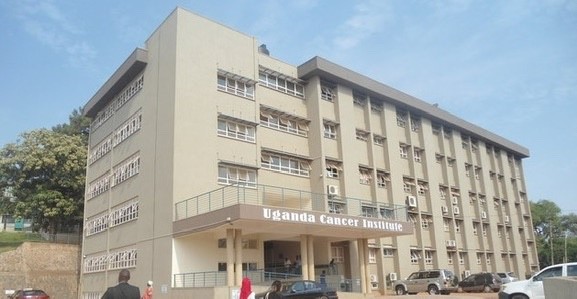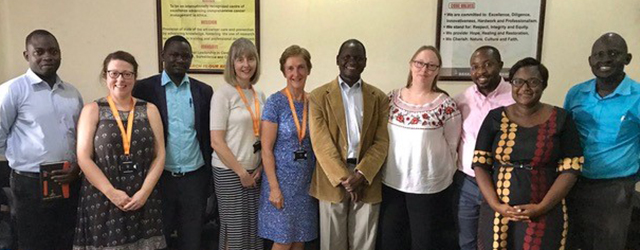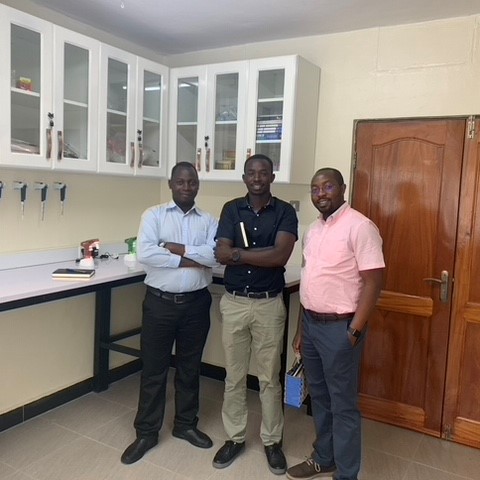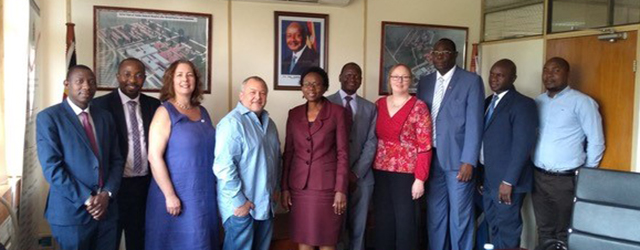
Suzanne Turner, co-lead of our Paediatric Cancer Programme, writes below about her recent visit to the Uganda Cancer Institute and progress on a collaborative research project on Burkitt lymphoma. This project is part of the Uganda Cancer Institute – Cambridge Collaboration initiative.
I have been fortunate enough to have spent time on sabbatical at the Uganda Cancer Institute (UCI) in Kampala where we have been setting up a lab and a biorepository to conduct research into understanding the pathogenesis of endemic Burkitt lymphoma (eBL), first described by Denis Burkitt at the UCI in 1957.
Burkitt lymphoma is a cancer of the B cells of our immune system which in Sub-Saharan Africa (SSA) is a consequence of EBV infection in malaria endemic regions.
In contrast, in the UK and other developed nations, sporadic Burkitt lymphoma (sBL), whilst looking exactly the same under the microscope is less often associated with EBV and never with malaria but can develop in the context of immunodeficiencies.
Whilst sBL has an excellent prognosis in developed nations with overall survival in excess of 90%, there is currently no consensus on how to treat relapse patients for whom the outlook is dire. In addition, children with sBL receive a combination of toxic chemotherapeutic drugs and, in some cases, we are likely over-treating although we currently have no biomarkers that might indicate which children would benefit from dose de-escalation.
The situation is very different in SSA and in Uganda. The survival rate for children with eBL is around 40-50% whereby children receive a combination of just 3 chemotherapeutic drugs; administration of more drugs is not possible as the local facilities are not able to support children suffering from the toxic side-effects of increased treatment.
Hence, our research in Uganda and Cambridge seeks to address the clinical issues specific to these two populations of children – dose escalation without significant toxicity in SSA and dose de-escalation and prevention of relapse in developed nations.
We are exploring these issues through the development of patient derived xenografts, drug screening and tumour genome sequencing in both Uganda and Cambridge. The team conducting this research is: Sylivester Kadhumbula, a technician based in the UCI who visits Cambridge for training; Marta Ferraresso, a postdoc and Cambridge PhD graduate who has been based in the UCI for the past year (both funded by the Global Challenges Research Fund); and Jamie Matthews, a Cambridge-based PhD student funded by the Alex Hulme Foundation.
On my first sabbatical visit in 2019, we spent time setting up facilities, discussing projects and planning future grant applications and procurement of equipment. On my second visit in January 2020 it was encouraging to see the equipment in place in our newly refurbished lab in the UCI.
In the new lab, we have liquid nitrogen storage tanks and a -80 freezer to start biobanking patient samples for which full ethics is in place. After much hard work by the team, we are now on the cusp of making great research progress!
My visit overlapped with the launch of the CRUK Cambridge Institute - Uganda Cancer Institute summer school which provided us with an opportunity to meet with the prime minister, Dr Ruhakana Rugunda and the minister for health in Uganda, Dr Jane Aceng.
My stay in Uganda also overlapped with the visit of a team from Addenbrooke's representing Cambridge Global Health Partnerships. Denise Williams, paediatric oncologist, Helen Starace, paediatric physiotherapist and Nicola Day, a physiotherapist specialising in oncology rehabilitation and exercise, visited the paediatric oncology ward and their team led by Joyce Balagadde-Kambugu to explore ways of working together in the future.
I look forward to exciting times ahead with a long and fruitful collaboration between Cambridge and the UCI.
Experts from the Uganda Cancer Institute visited Cambridge in May 2019



















